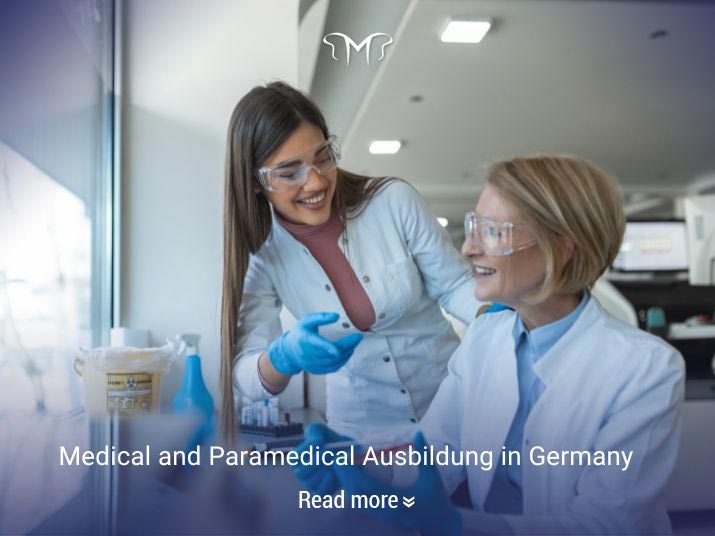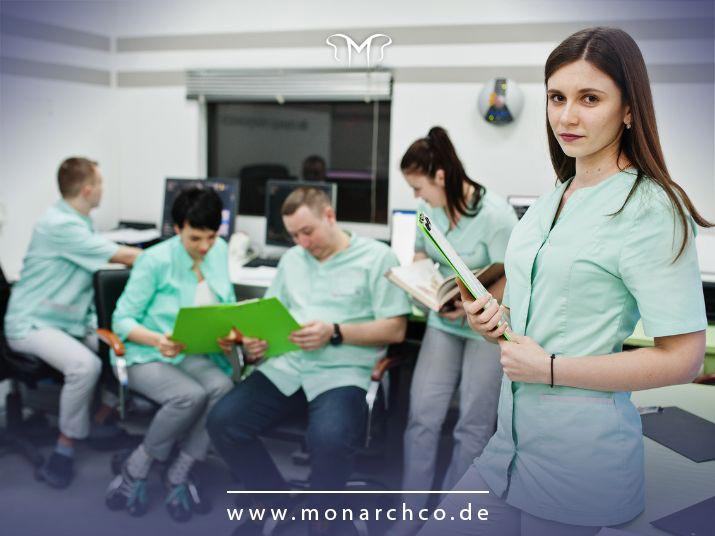
Medical and Paramedical Ausbildung in Germany
Ausbildungs are training courses in Germany that provide applicants with the opportunity to study in various fields, including technical and vocational, medical and paramedical, nursing, etc., without having a university education and only having a diploma, and after receiving a valid degree, enter the German labor market as an expert in the relevant field. Among these professions, medical and paramedical Ausbildungs are considered the most popular of these courses due to their reasonable income and guaranteed career future. These courses take about 3 to 4 years and include fields such as laboratory sciences, optometry, physiotherapy, audiometry, physiotherapy, etc. In this article, we decided to talk in detail about medical and paramedical Ausbildungs; so if you are interested in this topic, stay with us until the end.
Types of Medical and Paramedical Ausbildung in Germany
As we mentioned, medical and paramedical Ausbildung courses are among the most popular Ausbildung courses for work immigration to Germany due to their location, social status and good income, and Germany has also provided high-quality infrastructure for training in these courses. Below, we will review the list of German Ausbildungs in the field of medicine and paramedical:
Dental Assistant Ausbildung
Dental Assistant Ausbildung in Germany is a training course that trains and prepares the workforce specialized in dentistry to enter the country's labor market. Like other medical training courses in Germany, this course includes theoretical and practical training and teaches students the skills necessary to work in clinics and dental offices. Among the skills that applicants will be trained in this course are dental and oral surgery, dental radiography analysis, preventive oral health advice, assisting the doctor during treatment, preparing the office and operating room environment, etc. It should be noted that applicants must meet the following requirements to participate in the Dental Assistant Ausbildung course:
- Minimum German language level B2
- Minimum educational qualification: Diploma
- Maximum age requirement: 30 years
- Financial means to live in Germany
Dental Technician Training (Ausbildung) in Germany
The dental technician training in Germany is one of the vocational training programs in the medical and paramedical fields, designed to educate and prepare dental assistants. Like other vocational training programs (Ausbildung), this program combines practical and theoretical education in dentistry. Students acquire the skills necessary to work in dental offices and clinics.
This Ausbildung lasts for three years and includes theoretical subjects such as anatomy, physiology, biochemistry, radiology, dental prosthetics, and dental surgery. Students complete practical internships in clinics and, upon passing the required exams, receive their certification. After obtaining the certification, they can start their career as certified dental technicians.
It’s worth noting that applicants must have at least a high school diploma, B1-level proficiency in the German language, and be at least 18 years old. Although the job market for this profession is promising and it is considered one of the highest-paying vocational training fields in Germany, competition for work permits and starting positions is intense. Therefore, dental technicians must continually update their skills with the latest innovations and technologies.
Psychology Training (Ausbildung) in Germany
Psychology training in Germany is an ideal choice for individuals interested in pursuing a career in this field. This vocational program provides essential and practical education to help applicants enhance their psychological skills and prepare for the job market.
The curriculum includes topics such as clinical psychology, social psychology, industrial psychology, and organizational psychology. Students also gain skills in counseling, psychological analysis, and therapeutic methods. Internships for this training are typically conducted in healthcare centers, schools, and other psychology-related organizations.
The main requirements for enrolling in the psychology training program are a minimum of a high school diploma, proficiency in the German language, and a minimum age of 16 years.

Nutrition Specialist Training (Ausbildung) in Germany
Nutrition training in Germany is another vocational program in the medical and paramedical fields, focusing on educating experts in nutrition and dietary counseling. These programs cover subjects such as nutrition science, dietary counseling techniques, body physiology, and nutritional assessment methods.
Given the emphasis on health and nutrition in developed countries, particularly in Germany, the job market for this profession is highly favorable.
Steps in Nutrition Specialist Training (Ausbildung) in Germany
-
Initial Education:
-
A minimum of a high school diploma is required.
-
Participating in Training Courses:
-
This includes both theoretical and practical lessons on various aspects of nutrition, health, and dietary counseling.
-
Internship Participation:
-
Practical hands-on experience is gained through internships in relevant settings.
-
Passing the Final Exam:
-
Successfully passing the final examination to earn certification.
Midwifery Training (Ausbildung) in Germany
Midwifery training is another vocational program in the medical and paramedical fields in Germany. This program spans three years and consists of:
-
1,600 hours of theoretical education
-
3,000 hours of practical training
Upon completion, graduates can enter the workforce as childbirth nurses or midwives. In recent years, midwifery education has undergone changes, transitioning to formal academic programs within nursing Ausbildung.
Currently, Germany has approximately 27,000 skilled midwives working in this field. Due to the high responsibility and complexity of this profession, it is categorized as a highly demanding career.
Activities Performed by Midwifery Training Graduates:
-
Prenatal preventive examinations (e.g., monitoring blood pressure, tracking maternal weight changes, etc.).
-
Conducting childbirth preparation exercises.
-
Assisting mothers during childbirth.
-
Caring for mothers in the delivery room.
-
Providing breastfeeding guidance and postpartum care for mothers.
Optometry Training (Ausbildung) in Germany
Optometry training is a three-year vocational program that combines theoretical and practical education in optometry and vision science. Participants gain the skills necessary to work in optical stores and vision care centers.
Professional Training Includes:
-
Economic Topics: Understanding the business aspects of the profession.
-
Equipment Knowledge: Learning how to operate lens-cutting machines and optical tools.
-
Practical Training: Hands-on experience in workshops and optical shops.
Responsibilities of Trainees in Optometry:
-
Customer Interaction:
-
Guiding customers in choosing suitable eyewear based on medical prescriptions.
-
Lens Cutting and Assembly:
-
Using specialized machines to cut and fit lenses.
-
Eyewear Preparation and Repair:
-
Preparing glasses as per customer orders and performing repairs when needed.
Physiotherapy Ausbildung
Physiotherapy Ausbildung in Germany is a reputable and popular training course that allows applicants to work as physiotherapists in the German labor market. Physiotherapy Ausbildung takes between 3 and 4 years and includes a combination of theoretical and practical training. The training program of this course is as follows:
First year: Introduction to anatomy and physiology of the body
Second year: Focus on pathology and treatment techniques
Third year: Training in prevention and rehabilitation techniques
It should be noted that a minimum diploma, proficiency in German and a maximum age of 25 years are among the main requirements for participating in this medical and paramedical Ausbildung course. No need for a specialized degree, abundant job opportunities, decent income, job security, etc. can also be listed as advantages of participating in this course. In general, physiotherapy training is a unique opportunity for people who are looking to enter the world of physiotherapy and work in a dynamic and humane environment.
Nursing training
Nursing training is one of the most popular, highest-paying and most well-known training courses for nurses to immigrate to Germany. By participating in this course, applicants learn the necessary training to work in German medical centers. This course, like other medical and paramedical training courses, takes about 3 years. Also, a German language certificate, a diploma and an age requirement of at least 18 are among the entry requirements for this course. The nursing training course also includes theoretical and practical training, and trainees work in hospitals or other medical centers for 4 days a week and dedicate one day of the week to theoretical classes. Finally, after completing the nursing professional training course or the nursing training courses for the elderly in Germany, participants can work in hospitals, clinics, nursing homes, etc. Given Germany's strong need for nursing experts and the welfare that the government has provided for nurses, this job is one of the highest-paying fields of nursing training in Germany, which is why the number of nurses migrating to Germany has increased significantly in recent years.
Anesthesiologist Training
Anesthesiologist training in Germany is another field related to medicine in Germany that is held in the form of an Ausbildung course. This medical and paramedical Ausbildung course has the same entry requirements as other Ausbildung courses and includes theoretical and practical training with educational content of pharmacology, anatomy, hygiene, planning and management of intelligence, post-anesthesia care, etc. During their internship, students also perform tasks in hospitals and medical centers, such as preparing medications and equipment, and monitoring patients' breathing and circulation. Overall, this course is not only an opportunity to acquire professional skills, but also helps those interested in working in the most vital branches and disciplines related to medicine.

Income of Trainees in Medical and Paramedical Training (Ausbildung) in Germany
The income of students in medical and paramedical Ausbildung programs in Germany depends on several factors, such as the field of study, the institution where they are enrolled, and the year of training. Typically:
-
First Year: Approximately €900 per month.
-
Second Year: Around €1,050 per month.
-
Third Year: Between €1,140 and €1,300 per month.
The exact amounts may vary depending on whether the institution is public or private and the specific field of training. For instance, radiology trainees only receive stipends if they are enrolled in public schools.

Required Documents for Enrollment in Medical and Paramedical Training (Ausbildung) in Germany
To participate in these programs, the following documents are typically required:
-
Minimum Education: High school diploma (completion of secondary education).
-
Health Certificate: Proof of physical and mental health.
-
Language Proficiency: German language certificate at the B2 level.
-
Health Insurance: Valid health insurance coverage.
-
Criminal Record Check: Certificate of no criminal record.
-
Relevant Experience or Certifications: Evidence of related work experience or certifications in relevant fields.
Career Prospects for Graduates of Medical and Paramedical Training in Germany
Medical and paramedical Ausbildung in Germany offers not only a highly structured educational path but also promising career opportunities. Due to Germany's ongoing demand for skilled healthcare professionals, graduates can seamlessly enter the job market.
Expected Salary:
-
Entry-level salaries start at €2,500 per month.
-
In certain fields, such as nursing or medical laboratory sciences, salaries can reach up to €6,500 per month.
Additional Benefits:
-
Paid annual leave.
-
Rotational shifts for work-life balance.
-
Comprehensive insurance coverage.
-
High living standards in Germany.

Job Opportunities for Medical and Paramedical Trainees in Germany
After completing the training, graduates can find employment in various sectors, given Germany's strong healthcare infrastructure. Opportunities include:
-
Hospitals: Roles like nurses, physician assistants, or other medical support staff.
-
Specialized Clinics: Providing treatment and care in specific fields.
-
Private Practices: Assisting doctors and specialists in private offices.
-
Rehabilitation Centers: Working in physiotherapy or occupational therapy.
-
Laboratories: Conducting diagnostic and scientific tests.
-
Public Health Centers: Offering healthcare services to the community.
Final Note
Medical and paramedical Ausbildung in Germany is a practical and efficient path for those aspiring to join the German healthcare system. These programs are meticulously designed to combine theoretical education and practical experience, equipping students for real-world challenges in clinical environments.
If you are considering enrollment in nursing, medical, or paramedical training programs in Germany or seeking information about work migration, Monark Migration Services offers expert advice and free support for nursing professionals aspiring to move to Germany.
FAQs
What types of medical and paramedical Ausbildung programs are available in Germany?
Programs include physiotherapy, dental assisting, optometry, nursing, anesthesia technology, and more.
What are the responsibilities of midwifery graduates after completing their training?
These include prenatal care, childbirth preparation, assisting during delivery, postpartum care, and breastfeeding guidance.
What is the job outlook for medical and paramedical training graduates in Germany?
Germany’s advanced healthcare system and high demand for healthcare workers ensure excellent job prospects for graduates.


